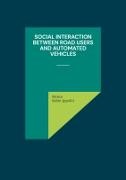Read more
Self-driving cars are currently operational in certain urban areas. Despite these
designated zones presumed to be optimal, concerns over incident rates and shifting
public opinion necessitate a focus on the social integration of these technologies.
The ability of self-driving cars to navigate informal interactions and
unexpected situations, a critical aspect of social behaviour, falls short due to the
absence of human-centric communication transfer in urban mixed traffic where
self-driving cars and humans coexist. Recognizing the social context of traffic, the
thesis aims to address the gap in social interaction and position fully Automated
Vehicles (AVs) as social agents.
Achieving widespread accessibility for AVs goes beyond technological advancements;
it requires successful social integration. The present thesis contends that
failure to integrate the social agency of AVs during design could diminish their
usability and overall success. Understanding social behaviour in traffic and how
AVs function as social agents is crucial to resolving interaction challenges and
ensuring seamless coexistence with human road users.
About the author
Hatice Sahin Ippoliti finished her PhD in Human-Computer Interaction at the University of Oldenburg/Germany. Her PhD research focuses on the interaction between vulnerable road users and automated vehicles, and prosocial behaviour in traffic.

